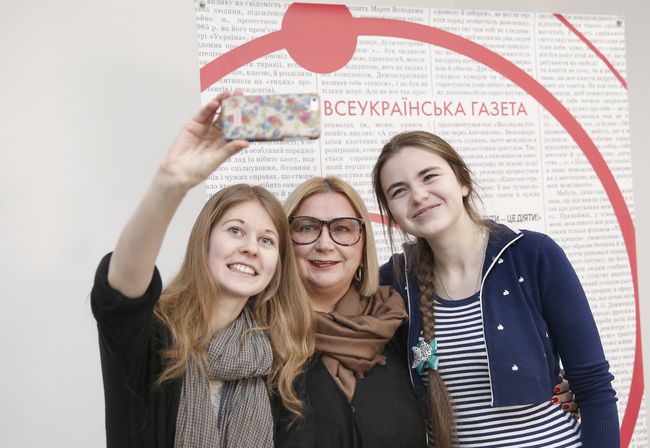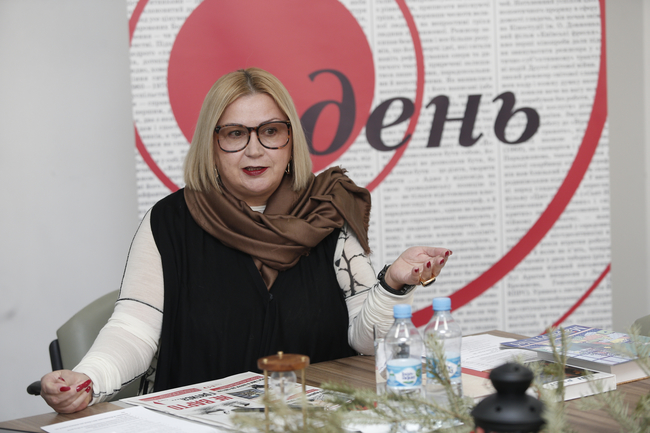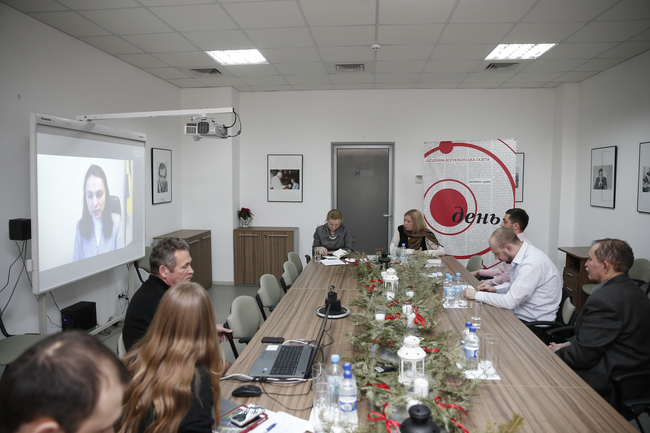Time to take decisive steps
Larysa IVSHYNA answers questions in conjunction with the 20th anniversary of her tenure as Den’s editor-in-chief
During an online conference with readers, contributors, analysts, and friends of the Ukrainian-Russian-English periodical Den/The Day, Editor-in-Chief Larysa Ivshyna started by saying she could’ve had an ordinary working day on January 13, even though it marked the 20th anniversary of her tenure, but Ivan Kapsamun, head of the politics desk, had told her with a smile: “This will be a very special date and you wouldn’t be you if you didn’t do something special.” And so it happened. Indeed, 20 years is an epoch in terms of journalism and Ms. Ivshyna held an online conference, for the first time and in response to numerous readers’ requests.
Arrangements had been made, posting ads, sending emails across Ukraine, followed by some 100 questions sent by European dignitaries, Ukrainian MPs, colleagues, philosophers, students, academics, among them Ostroh Academy Rector Ihor PASICHNYK; analyst and journalist Lilia SHEVTSOVA; Marek SIWIEC, ex-Vice President of the European Parliament; Russia’s first and only Secretary of State Gennady BURBULIS (who signed the Belavezha Accords signaling the fall of the Soviet empire); Hanna HOPKO, Chairperson of the Verkhovna Rada’s Foreign Affairs Committee; Igor YAKOVENKO, ex-Chairman of Russia’s Writers’ Union; Hlib HOLOVCHENKO, CEO, Channel Tak-TV (Mykolaiv), Secretary, National Writers’ Association of Ukraine.

Hlib HOLOVCHENKO: “I would like to congratulate Ms. Ivshyna on her 20th anniversary as editor-in-chief of Den/The Day. This long a tenure is a real feat of arms in terms of quality journalism, unbiased analysis, and common sense, along with the Library Series. Over the years you have succeeded in making a periodical that sets a classic example in Ukraine’s media community.”
Many others agreed with him, expressing their appreciation of Ms. Ivshyna’s numerous creative projects. Then there were numerous questions, concerning gaps in Ukraine’s latter day history, social and political trends, her personal feelings about them… The online conference was provided for by http://www.adamant.ua/ and http://www.ukrlife.tv/.
For want of time, Ms. Ivshyna could respond to perhaps ten percent of the questions received, but she will try to answer most of them later. Her answers will be carried by Den/The Day on a regular basis.
Below are what we believe were the most interesting questions and answers for those who missed the online conference.
Hanna HOPKO, Chairperson, VR Foreign Affairs Committee:
“How have you succeeded, over the past two decades, in keeping such a high journalist and intellectual standard? What is your cherished dream?”
Larysa IVSHYNA: “My cherished dream would be fulfilled if all those who have read my periodical over the past 20 years – and said they like it – subscribed to it, and talked their relatives and friend into following suit. That way we’d generate an intellectual environment. Yevhen Chykalenko said one had to serve the Ukrainian cause to the bottom of one’s wallet. We have to develop a habit of doing good things automatically. This would make life in Ukraine so much easier. Also, 2017 will mark the 500th anniversary of Martin Luther’s Reformation. His Small Catechism proved especially effective in helping parents teach their children. We’re urging our readers to do the same: read our newspaper, read our books. If they do, my cherished dream will be fulfilled. I want Ukraine to generate the critical mass needed for the thinking people to change its life for the better. An ambitious desire, but that would be my answer to your question… I believe that Ukraine is doomed to become a developed country. I also know that this will take a very big effort. High intellectual standard is a must, because if you set yourself routine editorial tasks, you’ll end up retelling [official] history. Otherwise, good ideas tend to appear. Some of them may sound incredible at first, but they do emerge and prove effective.”
Igor YAKOVENKO, ex-Chairman of Russia’s Writers’ Union, media expert, regular contributor to Den/The Day:
“Congratulations on the 20th anniversary of your tenure as editor-in-chief and same to all my colleagues and friends in Ukraine. It’s important for us to keep our time synced these days. My question is: Whom would you name as the best Russian and Ukrainian journalists? Suppose you mention three Russian and three Ukrainian names. Also, for ethical reasons, suppose you mention no one on your payroll.”
L.I.: Then who is left over here (smiling)? In fact, I’d rather cry than smile. My journalists are a different kind altogether. We’re trying to write stories rooted in a clear cut worldview and principled approach. Our contributors share our views and principles. As for my colleagues in Russia, before the war [in the east of Ukraine] I would’ve named more than three and said they were topnotch... Now I’m not sure. We once enjoyed Leonid Parfyonov’s productions, but then he took his stand with regard to Crimea and the war in the east [of Ukraine]. I saw this as an act of conformism and the man didn’t make his stand clear, so I can’t state, in all honesty, that he is a [Russian] media man whom I hold in esteem. Dmitry Shusharin, one of Russia’s top analysts, used to cooperate with us, but then he started behaving strangely... Or take Semen Novoprudsky, an interesting journalist. And Boris Sokolov... Let me tell you, Mr. Yakovenko, that I’m proud to have you as our contributor. I appreciate your cooperation and I believe that your Russian journalist standard is an example for your colleagues there.
“At one time we used to say that Russia reads Izvestia, America reads The New York Times, and Ukraine reads Den. All this have changed over the years. To begin with, Izvestia journalists published a book entitled End of Journalism. Forget It. I also respected the Novaya Gazeta staff, but after I met with Dmitry Muratov in Kyiv, after Russia had annexed Crimea, all he had to say was aren’t you going to visit Crimea again. Then there was Anna Politkovskaya, an example of honest to God journalism worth being emulated in Russia and Ukraine... I can think of no other names in Russia, because all the other media people have served the regime after the war broke out in the east of Ukraine.
“Talking of Ukrainian media people, I’d first mention Channel 1+1 journalist Andrii Tsapliienko with his reports under enemy fire from the Eastern Front. Then there is Yurii Makarov, a true principled intellectual with a broad worldview. And, of course, Vitalii Portnykov, a workaholic, a living encyclopedia; also, a number of young people who wholeheartedly supported our Project ‘Ukrainian Journalism Platform.’”
Andrii BAUMEISTER, Ph.D., Associate Professor, Faculty of Philosophy, Taras Shevchenko National University:
“May I ask you a ‘personal’ question? What makes you act contrary to the ‘official line’? Where do you get that strength and inspiration? Another, more banal question: What do you think Ukraine will look like five-ten years from now? What do you think this country should be like to your heart’s content?”
L.I.: “Very good questions, especially the second one. I believe that Ukraine has exhausted the clannish-oligarchic potential after the fall of the Soviet regime. All its structures have stagnated and fallen apart... Now we can start from scratch. All it takes is our joint dedicated effort. We have to make clear what we want, I mean concept/design and quality building material... We have a joke at the editorial office, something like we can write in order to ward off an evil curse. I think what we’re actually doing is encouraging our readers to come up with new ideas that will help them live a better life...
“Ukraine could become a magnet, being in the heart of Europe, attracting other countries the way she was expected to become after the fall of the Soviet Union. She failed at the time. Now we have to get back to that mission. We must fulfill mind-boggling tasks. To think that at one time our readers asked how Ukraine could help Russia. That sounded exotic even before Russia invaded our country, but even now few, if any, can answer this question. Still, we have to have an answer, just as we have to share the responsibility for the Russian Federation with Great Britain. Grand Prince of Kyivan Rus’ Volodomyr Monomakh [known in Russian historiography as Vladimir II Monomach] is believed to have first married Gytha of Wessex, illegitimate daughter of Harold of England. He begot Yuri Dolgorukiy who became Grand Prince of Kyivan Rus’ and founder of Moscow. Hence our historical responsibility for Russia that we must respect. Russia has taken the wrong stand with regard to Ukraine. Russians have stolen our [national] identity. Several generations have been raised in what I’d call the wrong coordinate system. We must try to solve Russia’s problem and help her get back on the right path – perhaps follow the United States’ example and become a federal democracy, rather than that mythical Rus’ [offered by Kremlin propaganda]... I appreciate the cooperation with our philosophers and I’m grateful for their interesting questions...”
Marek SIWIEC, ex-Vice President of the European Parliament:
“Greetings! Your 20-year tenure as editor-in-chief serves as a classic example of Ukrainian journalism, considering the twists and turns in Ukraine’s political and public life. You have been able to trace those twists and turns shortly after Ukraine had proclaimed its national independence. Two questions, if I may. Number one: Considering what’s happening in Ukraine, do you believe that the official European integration line will be kept, or that some events may occur that will get your country back under the Moscow hand? Number two: If you were the foreign minister, what would you do first with regard to Ukraine-Poland relations?”
L.I.: “In fact, we must constantly look for answers to your questions. Risks are certainly involved. Russia has invaded and is fighting Ukraine not only in the east, but also through Europe. Remember Marine Le Pin’s statements, European MPs visiting Crimea – and all this appears to come to pass as if nothing happened. Russia is also attacking Ukraine through Poland, and that really hurts! Considering our historical experience, Ukrainians and Poles should be lifelong partners. Russia has driven the Obama administration up the wall in Syria. That was a long planned strategy. What’s there to prevent the Poles from falling into Russia’s [propaganda] traps involving historic sites? The changes in Poland’s political moods are playing [into the Kremlin’s hand], threatening Ukraine as well as Europe.

“As regards your second question, here everything is highly hypothetical. As a matter of fact, I never thought of becoming an editor, let alone prime minister. One of the books in our Library Series is entitled Wars and Peace, or Ukrainians and Poles: Brothers/Enemies, Neighbors. This book has answers to many important questions. If I could, I would establish a Jerzy Giedroyc Culture Center in Kyiv and would urge the Poles to pay tribute to Andrii Potebnia who was a Ukrainian aristocrat and officer of the tsarist Russian army who sided with the Poles during the 1863 revolt. I can’t remember a single event to that effect in Poland. This would be an adequate humanitarian exchange. We also have in our library a Ukrainian version of Jerzy Giedroyc’s book entitled The Editor’s Notes. Another goodwill gesture.”
Yurii SHCHERBAK, ex-Ambassador Extraordinary and Plenipotentiary of Ukraine to US and Canada; chairman, James Mace Price Public Stand Award Commission, writer:
“Question number one: What do you think is the most memorable date for your periodical (save for the October attempted coup)? Question number two: What books are you planning this year?”
L.I.: “I’ve mentioned Martin Luther and his 500th anniversary. I think we will cover the subject at length and depth. This is part of European history where Ukraine belongs. There is also the 15th anniversary of our Library Series: 30 publications with some 150,000 copies in print. All this courtesy of our businesspeople. Add here several reprints with special thanks to Mr. Bohdan Chervak. We want our books to reach our schoolchildren, and I would like to thank Ms. Lilia Hrynevych for her support for our project (she wasn’t a cabinet member at the time). We’re waiting for them to give us the signal to go ahead.
“We’re planning to establish a Mykhailo Vasylevsky Prize for our special correspondents in 2017, so our readers will remember those whose reportings were true, professional, and up to the highest moral standard. Mykhailo Vasylevsky was one of them and this prize will help his colleagues raise their professional level.”
Lilia SHEVTSOVA, Russian journalist, associate fellow at the Royal Institute of International Affairs (Chatham House):
“Dear Ms. Ivshyna, your friends in Moscow and yours truly are sending their heartfelt greetings. We have two questions. Number one: The crucial point in your editorial career, one that made you very happy or very sad. What was it? Number two: What’s the biggest challenge facing your periodical? Once again, greetings and the best of success!”
L.I.: “The 1999 elections came as the biggest challenge. I’d said that Ukraine stood a real chance of making a ‘quantum jump,’ catching up with the developed European countries that are now members of the European Union. I remember the way Ukraine joined the Council of Europe, thanks to Prime Minister Yevhen Marchuk – and this remains probably Ukraine’s only official contact with ‘Big Europe.’ There were many ‘upstairs’ in Ukraine who had a dim view of the situation, what with monitoring, cleansing the Augean stables in the political realm, and other innovations. That first step forward met with strong resistance. Now try to picture the great many ideas the [presidential] candidate, Yevhen Marchuk, had, and the effort it took to prevent him from winning the campaign! The Ukrainian media had then enough material to write Shakespearean scripts. The current situation is bad enough not to allow a public exchange of unbiased ideas.
“There came the first and then the second Maidan – all this because the events that had taken place in 1999 remained misconstrued. I said at the time that we were out of step with big-time history. That was one of the crucial turning points. I found the editorial office half empty after the election night. Small wonder: defeat is an orphan. At the time I wasn’t sure what would happen to the periodical, but I said that we would focus on society from now on. My decision marked a new phase in Den/The Day’s history. I wanted our society to reciprocate. I thought this would mean its maturity. Only an immature society can keep receiving gifts without doing anything in return, without becoming a partnership member. This is a big challenge. Naturally, our periodical is meant for a special reading audience. I mean a thinking reading audience, where people read and decide whether or not they can do something after reading about something.”
(To be continued in the next issue)
Newspaper output №:
№4, (2017)Section
Society





